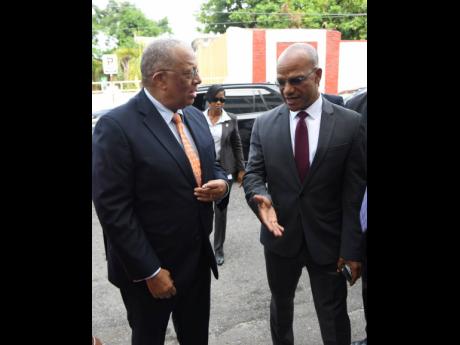Peter Espeut | Fighting at the trough
The difference between the votes cast for the two PNP Peters last week might have been 76, but if only 39 persons had voted differently, the result would have been reversed. Considering that it was only 39 people (about a busload) out of 2,778 delegates that decided the election for party leader, the victorious side has little to gloat about.
The unprecedented and extraordinarily high voter turnout (96 per cent) indicates that the delegates were highly motivated, believing much was at stake.
Was this an ideological dispute: Peter the capitalist candidate versus Peter the democratic socialist? I would love to believe that the PNP civil war was about which set of philosophical ideas should govern Jamaica’s future, but if the battle was about ideas, they debated in secret.
I do not believe that even PNP vs JLP election campaigns are about ideology anymore. Our two tribes are ideologically indistinguishable.
Was the PNP civil war about which Peter could beat Andrew? All political polls – even the private ones conducted by PNP partisans – show that neither Peter can come close to beating Andrew anytime soon. The PNP civil war was more about which Peter will get a chance to be beaten by Andrew.
I was the first to predict that Dr Peter Phillips would be the first leader of a major political party to fail to become prime minister, and I stand by that prediction; and I still don’t understand why the challenger couldn’t have waited until after the inevitable PNP loss in the next general election to make his bid for leadership. Maybe he didn’t want to be one among many challengers.
Or was the PNP civil war about a fight for scarce benefits and spoils? About who gets what, when, and how? About who gets to bury their noses in the political feeding trough? That is certainly the playbook for Jamaican interparty election battles. Is it far-fetched that intraparty contests have a similar rationale?
During the Peter-Peter contest, there were accusations of vote-buying on both sides. But then they should know, because there have been long-standing, vote-buying accusations against both parties in both general elections and by-elections in recent times. It has long been alleged that the package distributed to each member of the crowds rented for political rallies is a (green or orange) T-shirt, cap, wristband, vuvuzela, and $5,000. All paid for by private-sector donors.
No doubt the price per vote went up for this internal contest: there was a smaller number of voters, and seemingly a lot more at stake.
VOTE-BUYING ALLEGATIONS
What puzzles me is the unwillingness of the political ombudsman to investigate accusations of vote-buying. Is she afraid of what she will find?
Elections in Jamaica are certainly market-driven. There is both a market for votes – and more and more, the sellers seem to call the shots – and a market for the favours (contracts, jobs, waivers) that politicians can grant – and more and more, the buyers seem to call the tune.
Follow the money! The whole system is driven by the private sector, in whose interest the country is operated. Karl Marx was right! The State is the organ of the ruling class. It is they who will determine what happens in education, how the public transportation system is operated, and what will happen to the Cockpit Country. In our ‘democracy’, it is not what the ‘demos’ (the population) want, but what big business wants. It is not voters who count, but what the political donors (who supply the money to buy the votes) want.
And so, from the voters’ point of view, it comes down to who will offer them the most for their vote. Any hope for the future? Enlightened elements in the private sector could withdraw funding from this corrupt system. An enlightened electorate could refuse to sell their votes.
But from where will come the light?
Peter Espeut is a sociologist and development scientist. Email feedback to columns@gleanerjm.com.

